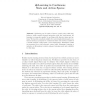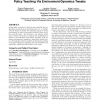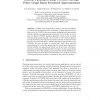109 search results - page 8 / 22 » Policy teaching through reward function learning |
AUSAI
1999
Springer
13 years 12 months ago
1999
Springer
Abstract. Q-learning can be used to learn a control policy that maximises a scalar reward through interaction with the environment. Qlearning is commonly applied to problems with d...
ATAL
2010
Springer
13 years 8 months ago
2010
Springer
In this paper we study, for the first time explicitly, the implications of endowing an interested party (i.e. a teacher) with the ability to modify the underlying dynamics of the ...
ACL
2009
13 years 5 months ago
2009
In this paper, we present a reinforcement learning approach for mapping natural language instructions to sequences of executable actions. We assume access to a reward function tha...
PKDD
2010
Springer
13 years 5 months ago
2010
Springer
Partially observable Markov decision processes (POMDPs) are widely used for planning under uncertainty. In many applications, the huge size of the POMDP state space makes straightf...
FLAIRS
2004
13 years 9 months ago
2004
er provides new techniques for abstracting the state space of a Markov Decision Process (MDP). These techniques extend one of the recent minimization models, known as -reduction, ...



